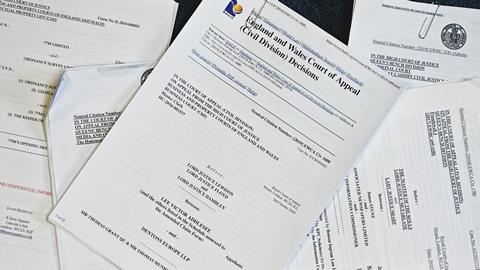Lawyers and journalists should not have to spend big sums of money accessing court judgments, an influential group of MPs has told the government.
Reforming the way judgments are stored and published is one of several recommendations made by the House of Commons justice select committee in a report published today on open justice.
As the Gazette revealed last year, the government turned to the National Archives to set up the first comprehensive and free online repository of court judgments from England and Wales. The Find Case Law service went live this year.
The committee welcomed the service, but added: '[This] should represent the first step in improving the public accessibility of judgments. HMCTS should reform the way that judgments are collected, stored and published so that there is less reliance on commercial legal publishers. The judgments of courts are the product of a publicly funded justice system and the public, the media and the legal sector should not have to pay significant sums for access.'
Other recommendations include exploring AI-powered transcription to reduce the cost of court transcripts, enabling magistrates’ sentencing remarks to be recorded and transcribed on request, and reviewing existing contracts to ensure transcripts are more accessible to journalists and the public.
A streamlined process should be introduced for accessing court documents, including court lists, using a digital portal modelled on the US-based Public Access to Court Electronic Records model. Information in the Single Justice Procedure that would have been available had the case been heard in open court should be published in a ‘timely fashion’.
Dr Natalie Byrom, head of the Legal Education Foundation's Justice Lab and a member of the Ministry of Justice's senior data governance panel, welcomed the committee's backing for the lab's calls to formalise the panel to provide effective oversight and governance of the collection, management and publication of court data.
'In an age of misinformation and fake news, access to reliable data about how justice is delivered is vital to support good journalism and maintain trust and confidence in the courts. Indeed, as the committee notes, the decline in court reporting from traditional media outlets makes the provision of accessible, public information even more important. However, as our own research has shown, arrangements for accessing court data and information are archaic, expensive and opaque,' Byrom said.
A Ministry of Justice spokesperson said: 'We fully support transparency in the justice system, including last week’s first-ever broadcast of a judge’s sentencing remarks in a murder case. We have also made court and tribunal judgments freely available from the National Archives and cemented journalists’ right to report trials and hearings in a new charter - ensuring they can continue keep the public informed.'
This article is now closed for comment.






























10 Readers' comments